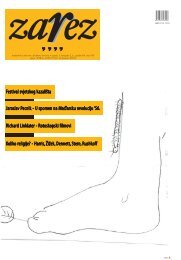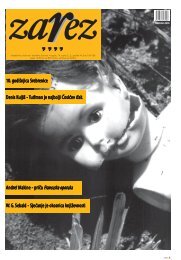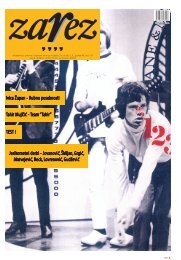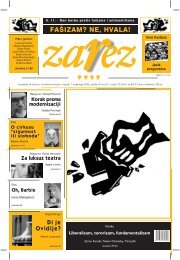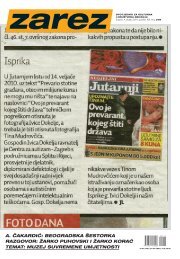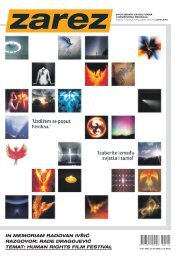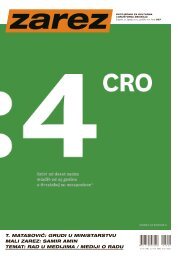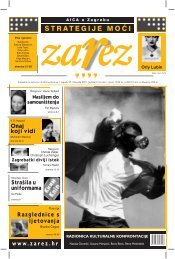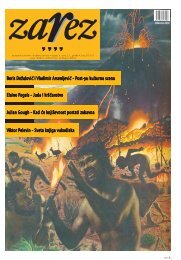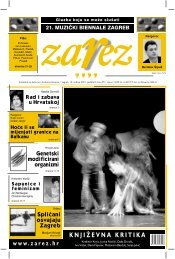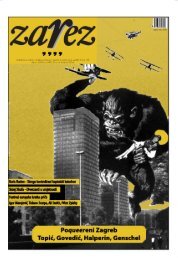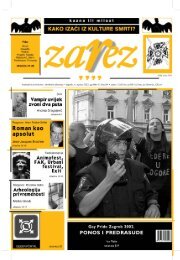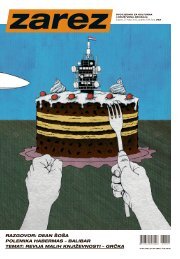22 II/40, 12. listopada 2,,,.Roman Simiæoman Simiæ (b. 1972, Zadar)is the editor of the literarymagazine Quorum.He writes poetry and fiction, andhas recently published his firstcollection of stories called ThePlace Where We’ll Spend the Night.Could you describe the genesisof the fictional world in your stories:how much do they owe toyour life experience, and how muchto your reading experience, i.e.to literature?– The symmetric proportion betweenlife experience and readingexperience is always the prerequisiteof its balance; it is this proportionthat reshapes the life experience intopatterns of reading experienceand what anchors the literature intothe experience we have already had.It is true that my stories (in relationto plot, time and place) lack referencesto my present life in Croatia.Perhaps it doesn’t make the readingeasier, but it certainly helped me. Ido understand that the stumblingblock in terms of reception of ThePlace Where We’ll Spend the Night isits refusal of what we recognize as"familiar reality", and I do realizewhy this is so hard to accept. I dohowever think that expectations tomake the text too familiar are ratherrigid and exclusive, and they showpossible limitations of readers. Whichdoesn’t mean that I’m trying topass the hot issue of the "guilt in thetext" from the writer to the reader.It only means that I hope for a receptionof the book which won’ttreat it as a failure just because theauthor rejects some self-implyingmodel of literary expectation. Betweenthe covers of the book I wantedto create a text that shall be judgedby its own likeability and persuasiveness,maybe even its faithfulnessto itself (if faith is the a<strong>pp</strong>ropriateword). We might say that I aspiredto be understood as if I havewritten a fantasy or an SF book.Is there a specific cartographyof your pataphysical world? Onthe North we find Conn, on theSouth – Yopa. But where does yourmap put places like Puertomarinand Panamatta? Is there any spaceleft for some new cities?– The wasteland where all the storiestake place is imagined as a huge,limitless territory, the space with rarelost cities that function as oases;the space where everything standsstill. The only ones who do changeare the eccentric "highwaynauts",creatures foreign to this world becausethey are both founders of itand strangers to it. Cities like Conn,Yopa or Panamatta are most oftenjust a random pile of many houses,and the center of the town spreadsnot around the squares, but aroundthe exceptional people. But thereare also much weirder cities, emptyshells of the former cities that "stink"of Europeness; the places thatjealously cherish their impotent citypride. Like Pouertomarin, which remembersthe sea only in its title (itis actually situated in the heart ofthe desert. It was ri<strong>pp</strong>ed off the seacoastby some tough old womanwho wanted to beach the big fishthat has been destroying the dreamsof her family for centuries). It’s difficultto draw a map of this world,because it is hard to calibrate themeasuring tools. Distance is all andall is distance. In any case, there isalways a reason for staying and standingstill. That is why these citiesdon’t really know about each other;they merely suspect they are notalone. American circle and Hispaniccircle, protestants and Catholics,they all make some kind of a Pan-Americanpreapocalyptic or postapocalypticdesert.Why do you withold the informationfrom the reader to such adegree? Tell us more about thisstylistic reduction, which you oftenuse in your dialogues?– I do not think that I withold theinformation from the reader thatmuch (at least not in all the stories).The stories you are talking about,the ones based on dialogue and veryspare descriptions, the ones wherethe desert has inhabited both thestory style and the language, are notthe dominant ones (at least I don’tthink so). It’s true that for a while Iwas fascinated with the dialoguetechniques, but only because I wasn'treally sure that the dialogue ispossible. The world of The PlaceWhere We’ll Spend the Night is createdas a world were all conversationsare already spent, in which the speechis a useless tool that people keepout of laziness or sentiment. It isreally a world that suffers from thelack of syllogistic logic, which furthercomplicates the communication(or makes it easier, dependingon your habits). Reduction that youmention could also be explained withthe fact that the author is not familiarwith the world he writesabout, or it could be explained bymy laziness and literary influences...but the problem of any explanationis that it could justly be used as anexplanation for other, more informativestories in my book; and Iwrote quite a few of those.Rade JarakJosip MlakiæWhenthe Fog Liftspublished by "Nomad", Zagreb: 2000hen the Fog Lifts describes <strong>Croatian</strong>-Bosniacwar from the inner<strong>Croatian</strong> perspective, from theviewpoint of the man who finds himselfin the trenches, a target and a shooterat the same time. It shows profoundpolitical sensibility, level-headednessand honesty. It is a sensitive retelling ofa story that ha<strong>pp</strong>ened so many times indifferent places in Bosnia, Lika and Slavonia;the story about people who untilrecently lived togetheras godfathers,schoolmates or sportrivals, only to see itend in a bloody war.Mlakiæ's heroes areCroats and Muslimswho curse Allahwhen they’re angry,who speak the sameancient dialect, whosu<strong>pp</strong>ort the samefootball club (notZagreb’s “Dinamo”,not “Sarajevo”, butSplit’s “Hajduk”).Whether they hatedeach other beforethe war is utterly irrelevant:they had nochoice in the matter.So now they are aimingguns at each other, armed withdeadly intentions and deadly ammunition.And they’re waiting. They’re waiting,Mlakiæ writes with typical Bosnianfatalism, for the war to end, the sameway they would wait for a suddendownpour to stop. Even if this bookdidn’t fulfill our literary expectations, itwould still be great, thanks to Mlakiæ’sfair, fresh and innocent view of the timesthat were anything but innocent.Even if this book didn’t meet our literaryexpectations, it would be a greatone, because of Mlakiæ's fair, fresh andinnocent view on the times that wereanything but fair and innocent. (...)The case of Josip Mlakiæ is often rightlycompared with the case of RatkoCvetniæ and his novel A Brief Outing.Both writers entered <strong>Croatian</strong> literatureunexpectedly, and both wrote theirfirst novels in late thirties... When theFog Lifts, just like Cvetniæ's A Brief Outing,is on its way to becoming a fashionablesuccess with <strong>Croatian</strong> readers.However, I would not overdo the comparisonsbetween Mlakiæ and Cvetniæ.Cvetniæ wrote faction, Mlakiæ writesfiction. Cvetniæ wrote an autobiographicalessay, Mlakiæ wrote a short novelor a (longer) novella. The most importantdifference is Cvetniæ's insistenceon gloomy deromanticisation of theWar for <strong>Croatian</strong> Independence, as o<strong>pp</strong>osedto Mlakiæ's testimony about theimperialistic warthat puts every decentcitizen ofCroatia to shame.What's more, Mlakiæwrites about thewar with amazingsincerity, as if talkingabout his "natural"condition orthe clothes that hewears. He is nottrying to makethings a<strong>pp</strong>ear betterthan they are.Mlakiæ's bookhinges on its centralgimmick. Themain character isJakov Serdar, a warveteran from centralBosnia. Wemeet him in Zagreb, where he has beenhospitalized on a psychiatric ward withthe diagnosis of PTSP. He ended up inthe hospital after killing a fellow soldier,hijacking a military police vehicleand generally making a huge mess. Atthe request of his psychiatrist, Jakovwrites down his memories of the eventsthat transpired. We learn that Jakov hadkilled his best friend before the war,Mirsad, a Moslem. He killed him whenMirsad was taken prisoner, after findinga fake letter claiming that Mirsadhad an affair with Jakov’s wife. Ofcourse, Othello from Central Bosniahad to have his local Iago, here calledKeške. Keške is a cynical misanthropewho prefers cruel humor, and the realauthor of the incriminating letter aboutMirsad and Jakov's wife. What startedas an ugly joke, inexorably leads to tragedy...In contrast to numerous second-handaccounts of the war, Mlakiæ’s workis steeped in authenticity. The characters,the psychology and technology ofwar, the unique trench mentality, humorand sentimentality - all of this revealsa man who was there and who wasa sensitive observer. That doesn’t automaticallyguarantee a good book aboutthe war, but war experience is essentialfor such an endeavor, and it can be neitherborrowed nor bought.(...) Mlakiæ avoids the fiction of"quaint folk customs". He is an urbanthirty-five year old man whose language,culture and affinities correspond tothose of his generation. His referencesare Bulgakov and Led Ze<strong>pp</strong>elin, RollingStones and Siegried Lenz, comic heroCommander Mark and One Fly Overthe Cuckoo's Nest. Sounds a bit oldfashioned?But of course. We are talkingabout the generation that had beenrobbed by that biggest pyrotechnicspectacle of them all, the war, remainingculturally stuck in the era of highschool romances. (...)When the Fog Lifts is not a largebook; it is rather small, in terms of volumeand ambition. It does, however,possess astonishing honesty, sensitivityand poignancy. It also provides spacefor “little” things: local rogues, sparrows,looking through a window. Theyshare that space with enormous crimes,mud and alcohol. The more terrible thetimes become, the more important thelittle things get. In his small, unassuming,imperfect and rough way, Mlakiæoffers a fresh view on things that are almostimpossible to express, and hedoes so with understanding, intelligenceand compassion/empathy.Jurica PavièiæIrena VrkljanThe Last Journeyto Viennapublished by Znanje, Zagreb, 2000entral to the novel The Last Journeyto Vienna is the concept of“family secret”. The secret is thedomain of crime investigations, whilethe subject of family stands as a consistentpreoccupation of Irena Vrkljan'spoetics. Moreover, “family secret” is alocus communis of crime fiction, especiallythe old-fashioned, British schoolof mystery writing. You will find no forensicpathologists here, no serial killerprofiling units, or car plate experts. (...)In place of "perfect crime" planned withintellectual precision, the reader encountersjust a plain family secret. Soplain in fact, that you will find somethinglike it in almost every (normal!) family:illegitimate children, lost lovers,adoptions, unsuccessful search for lovethat never comes. Nothing asocial orpsychopathological; simply the pathologyof our daily lives and disturbed relationships.The only thing that The LastJourney to Vienna does has in commonwith modern crime fiction is the factthat it begins with a corpse...Irena Vrkljan's narration in The LastJourney to Vienna is consistently modernist,with the narration from the characters’point of view overshadowing theauthor’s narration in third person… IrenaVrkljan tells a typical family story,one of those that usually remain underlock and key, behind closed doors ofbourgeois homes. The crime (be it legalor ethical) becomes a part of family inventory,to be put away into trunks andboxes, up in the attic or down in the basement,until something unexpectedha<strong>pp</strong>ens and “some hand accidentallyrattles the skeleton in the closet...”Andrea Zlatar
II/40, 12. listopada,,,. 23Igor ŠtiksCastle in Romagnapublished by Durieux, Zagreb, 2000.gor Štiks’ novel is a deceptively ordinarypiece of reading, with a short,simple and open structure andtwo relatively “familiar” and parallel storiesthat melt into one. We could call it a lovestory, or a historical piece, or simply a topicalstory, but whatever we call it, we aredealing with a text that has been tailoredby a steady hand (and head) of a sophisticatedauthor. We should also mention thatCastle in Romagna is Štiks’ first work offiction…Štiks simply and clearly expands on theJurica PavièiæA Sunday Friendpublished by Znanje, Zagreb 1999he novel opens with a seriesof murders that are conceivedas a riddle. The killeralways leaves behind a particularmessage and a carefully arrangedmurder scene, with a dead body atits (symbolic, not geometrical)center. The framing method of thispsychopathological game eventuallybecomes more transparent to thereader than to the team of crime investigators,but the final solution still takesus by surprise without resorting to cheapgimmickry. Pavièiæ skillfully makes the sinistergame of the killer just one of the branchesin the storyline. Others lead ustowards the key contract of sevenpartners in dubious business...The detective, who is naturallythe main character, moves in a typicalprofessional, private and emotionalcontext. His last name isBarbir (we never find out his firstname), he is a youngish, recentlydivorced man who is carrying ontwo affairs: one is a budding romance,while the other is almostover. His police partner is a more traditonal,older, heavier man. The cinematic genrestructure is compensated by the serious, penetratingdescription of the social contexttypical for the late ‘90s... The political dimensionof the story is not just a "dressing"; itroots Pavièiæ's fiction deeply into <strong>Croatian</strong>reality. This crime story could not have possiblycome to life anywhere else but here, andthat’s more than we could say for much ofthe regular genre production. Pavièiæ capturesthe foreboding atmosphere of Splitin the '90s, and its social setting convincinglytranscends mere fictional scenery...Vedrana Martinoviæhistorical trauma of an individual who hasbeen denied any possibility of control overhis own life. He draws very direct parallelsbetween historical events, individual andcollective paranoia, political and romanticpassions from ancient and more recent history,both dominated by practically the samelexis, same mental code, and same fetishes.He combines the archaic/poetical discourseof Renaissance with the lexicon ofthe socialist-realist authoritarian mentality,spicing it up with the commentaries andobservations of our own era, the era of ironyand distance, fast moves and fast emotions,fast wars, fast food and fast motion,in the spirit of a digest epoch that increasinglyresembles something out of a comicbook.Castle in Romagna is a democraticbook. It speaks democratically about theirreparably despotic nature of the Homosapiens. The structure of the book is neitherepical nor unrestrained nor emotional,on the contrary, it a<strong>pp</strong>ears as a deliberatelyskeletal structure that allows the reader toimprint something of his/her own story. Itallows the reader to “write in” what s/hewants and can, to show the marks of timeand history. This book encourages readersto recognize what they are. The readers arefree to enrich it with their own experience,knowledge, or poetics, or they can reducethe book to a sketch, a croquis, if that fitstheir psychological profile better. Castle inRomagna tells a story of great passion in adispassionate, calm, almost absentmindedmanner. Like our era, it is callous.We must face the fact that what we havehere is a new, different aesthetic and emotionalsensibility, and I am sure that we canlearn something from it. Igor Štiks’ generationalready sees history (including recenthistory) as something that passed themby. Perhaps they don’t sense it yet, or maybethey just don’t know it, but “sins of fathers”always have to be repaid. In the fettersof 20th century global trauma, thisstuporous generation is dealing with itselfand its times the best way it can, protectingitself from pain. Maybe Castle in Romagnais a way, a first step towards teachingthis generation that there is a better, lessradical way. Perhaps, and maybe this iswhat Igor Štiks’ book is about, there isnothing more valuable than we are, thaneach individual person. Maybe we shouldrealize that all that drivel about the need tosacrifice for “higher goals” or “in the nameof higher goals” is just empty talk – empty,but lethal.Daša DrndiæMarinko KošèecThe IslandUnder the Seapublished by Feral Tribune, Split, 1999emands of chronological contextualizationwill probably leadto overlooking playful juxtaposingof extremely different stylistic registersthat Marinko Košèec employs in hisnovel The Island Under The Sea, focusinginstead on the war elements in Košèec’sfiction. Admittedly, Košèec is thechronicler of war, and with The IslandUnder theSea, he hasconsiderablystrengthenedthe corpus ofsubversive<strong>Croatian</strong> warfiction publishedin the'90s.WhileKošèec successfullyprovidesa newperspectiveon <strong>Croatian</strong>War of Independence,what is even more precious ishis ironic view of war events (the usualexcuse that the war is too recent to writeabout does not a<strong>pp</strong>ly to Košèec’s writing).However, the socio-political dimensionof the novel is not the onlyreason for its relevance. Košèec is thefirst author to ironize the turbo-folk variantof <strong>Croatian</strong> nationalism, althoughthat’s not his only target: he also ironizesthe idea of united Europe, feminismand French national narcissism (withspecial emphasis on its most dangerousderivative: Lepenism). He also settlesthe score with theoretical and criticaldogmatism of <strong>Croatian</strong> literary scene.(...)The Island Under the Sea is a Bildungsnovel with a highly picturesque structure.Vivid narration helps the reader toclosely follow the narrator's spiritualmetamorphosis. (...)One of the more charming featuresof the book is caricatural portrayal offamous heroes from <strong>Croatian</strong> politicaland literary scene (where the su<strong>pp</strong>osedmonumentality of many contemporaryfiction writers melts with suspicious easeunder the fiery gaze of our literaryrookie). Longevity of this novel is allbut guaranteed thanks to the way inwhich the author arranges the semanticnet of his motives throughout the book,thus multiplying meanings on every turnand creating the impression of continualnarrative flow. (...)The Island Under the Sea stands outamong more celebrated names of <strong>Croatian</strong>contemporary fiction as a genuinebreath of fresh air: it combines fun, intellectuality,sensitivity and topicality.This book was obviously written with agreat deal of relish, and I feel safe inpromising the same enjoyment to everyreader of Košèec’s new novel.Andreja GregorinaSlavenka DrakuliæAs If I AmNot Therepublished by Feral Tribune, Split, 1999hat redeems the novel As If I AmNot There is the author’s sensitiveand slightly sardonic understandingof the role ordinary "things"play in woman’s life. This is especiallyvital in view of the fact that the novelwas inspired by journalistic researchand data collected for the book on wartestimonies by victims of mass rape(from the victims’ standpoint, of course).That is also why the novel was "almostimpossible" to write.But what was "almost impossible" toshape into a journalistic discourse (asthe author herself has said), in the novelbegins and ends in Caroline's Hospitalin Stockholm, during March 1993.Drakuliæ begins the story with motivesof hatred and dreams of revenge, andwraps it up at the moment when herheroine lets go of hate and revenge andfeels the first signs of forgetting... Thestory is based on author’s journalisticresearch: the description of the centralevent in thenovel – rape ofthe main character– hasbeen adoptedfrom the author'sinterviewwith the actualrape victim,that is, fromthe authenticaccounts. Atthe same time,the novel keepsup a constantdialogue with writers of literatureabout concentration camps (JorgeSempurn being the most obvious influence).The third major influence comesfrom an unexpected source: contemporaryHollywood imaginarium orcontemporary media images of theworld. This excessive media literacy inDrakuliæ’s novel is precisely the reasonwhy the scenes of violence don’t seemtoo credible. After all, the heroine ofthe novel is a typical protagonist ofDrakuliæ's oeuvre: an urban girl obsessedwith "female objects" and the worldviewborrowed from women’s magazines...Gordana CrnkoviæRobert PerišiæFeel Free to Spit onWhoever Asks About Uspublished by Konzor, Zagreb, 1999e all know how tiresome the talkof “generations” among <strong>Croatian</strong>writers has become, but there isno doubt that Feel Free to Spit... is abook marked by a particular generation.Perišiæ’s “yearbook” functions as a pointat which many interests and tastes ofcontemporary <strong>Croatian</strong> readers come together.As an editor of a magazine aimed atreaders of a specific generation, Perišiæ surelyknows what his audience needs andlacks. Like other <strong>Croatian</strong> writers who cameto prominence during the nineties, hehas been heavily influenced by the “hall offame” from the literary magazine Quorum,namely such writers like Carver, Bukowski,Ondaatje, Irvine Walsh. Hisstrongest influence remains the genre ofurban landscape fiction. That is not, however,the final destination of Perišiæ's writing.He goes on to explore – in a documentarymanner – the actual social pulse, thesensibility of <strong>Croatian</strong> cities in the postwarperiod, with the attendant postwariconography. You will never catch Perišiætalking about "exotic places like Sumatraand Java" (to quote Ante Stamaæ, a literarytheorist from an older generation) that sopreoccupied older <strong>Croatian</strong> writers; hewrites about post-traumatic stress syndrome,heroin abuse, football fans, interest ratesand sublet tenants. The composite pictureof the literary decade that emergesfrom Perišiæ’s book reveals how much oftheir influences and methods the youngerwriters learned from their predecessors.However, the stable socialist existence ofthe previous generation was lost, so whatpermeates the nineties ficiton is anxietyand a sense of maturity.Feel Free to Spit... consists of twelve stories.Even a casual glance through thebook reveals that Perišiæ knows what hewants to say, but he is less certain of howto say it. All the stories are iconographicallyand thematically similar. As a rule, theydescribe the fragmentation of urban experienceseen through the eyes of a young,passive outsider, surrounded by hypocrisyand corruption, whose resignation slowlypushes him towards the "anything goes"attitude, drugs, exile, street violence, criminalactions, sex. Nevertheless, we cansafely say that Perišiæ is very prolific in findingnew ways of spinning the basically"same" storyover and overagain. He givesa nod to theAmerican traditionof shockingshort storywith a powerfulpunchline andexperimentswith narrativeminiatures. Hedoesn’tshyaway from classicaland completelycoherent,longer types of narration, nor does helack the skill in techniques like stream ofconsciousness, anarrative introspection,punning or interdiscoursive collage.Unlike most "new naturalists", Perišiæ isinterested in the language of the story.That is why his language becomes so interestingfor the readers, too. Perišiæ uses anexciting mixture of colloquial expressionsfrom Split and Zagreb, as well as slang andeven the archaic micro-dialects (whichdoesn’t always work in favor of story’s linguisticbalance). Besides quotations fromdifferent language-orders, it seems that athis heart of hearts what Perišiæ cares aboutthe most is polyphony and interdicoursivestyle, which is why his texts are so rich inheterogeneity and irony.Jurica Pavièiæ
- Page 2 and 3: 2 II/40, 12. listopada 2,,,.gdje je
- Page 4 and 5: 4 II/40, 12. listopada 2,,,.Davorka
- Page 6 and 7: 6 II/40, 12. listopada 2,,,.Nakladn
- Page 8 and 9: 8 II/40, 12. listopada 2,,,.Andrea
- Page 10 and 11: 10 II/40, 12. listopada 2,,,.Pjesni
- Page 12 and 13: 12 II/40, 12. listopada 2,,,.U uvod
- Page 14 and 15: 14 II/40, 12. listopada 2,,,.Irena
- Page 16 and 17: 16 II/40, 12. listopada 2,,,.o you
- Page 18 and 19: 18 II/40, 12. listopada 2,,,.n her
- Page 20 and 21: 20 II/40, 12. listopada 2,,,.In you
- Page 24 and 25: 24 II/40, 12. listopada 2,,,.Miljen
- Page 26 and 27: 26 II/40, 12. listopada 2,,,.Sonja
- Page 28 and 29: 28 II/40, 12. listopada 2,,,.Marink
- Page 30 and 31: 30 II/40, 12. listopada 2,,,.Igor M
- Page 32 and 33: 32 II/40, 12. listopada 2,,,.eljko
- Page 34 and 35: 34 II/40, 12. listopada 2,,,.FRAKCI
- Page 36 and 37: 36 II/40, 12. listopada 2,,,.Miljen
- Page 38 and 39: 38 II/40, 12. listopada 2,,,.Sonia
- Page 40 and 41: 40 II/40, 12. listopada 2,,,.Marink
- Page 42 and 43: 42 II/40, 12. listopada 2,,,.Igor M
- Page 44 and 45: 44 II/40, 12. listopada 2,,,.eljko
- Page 46 and 47: 46 II/40, 12. listopada 2,,,.Frakci
- Page 48: 48 II/40, 12. listopada 2,,,.Hrvoje



